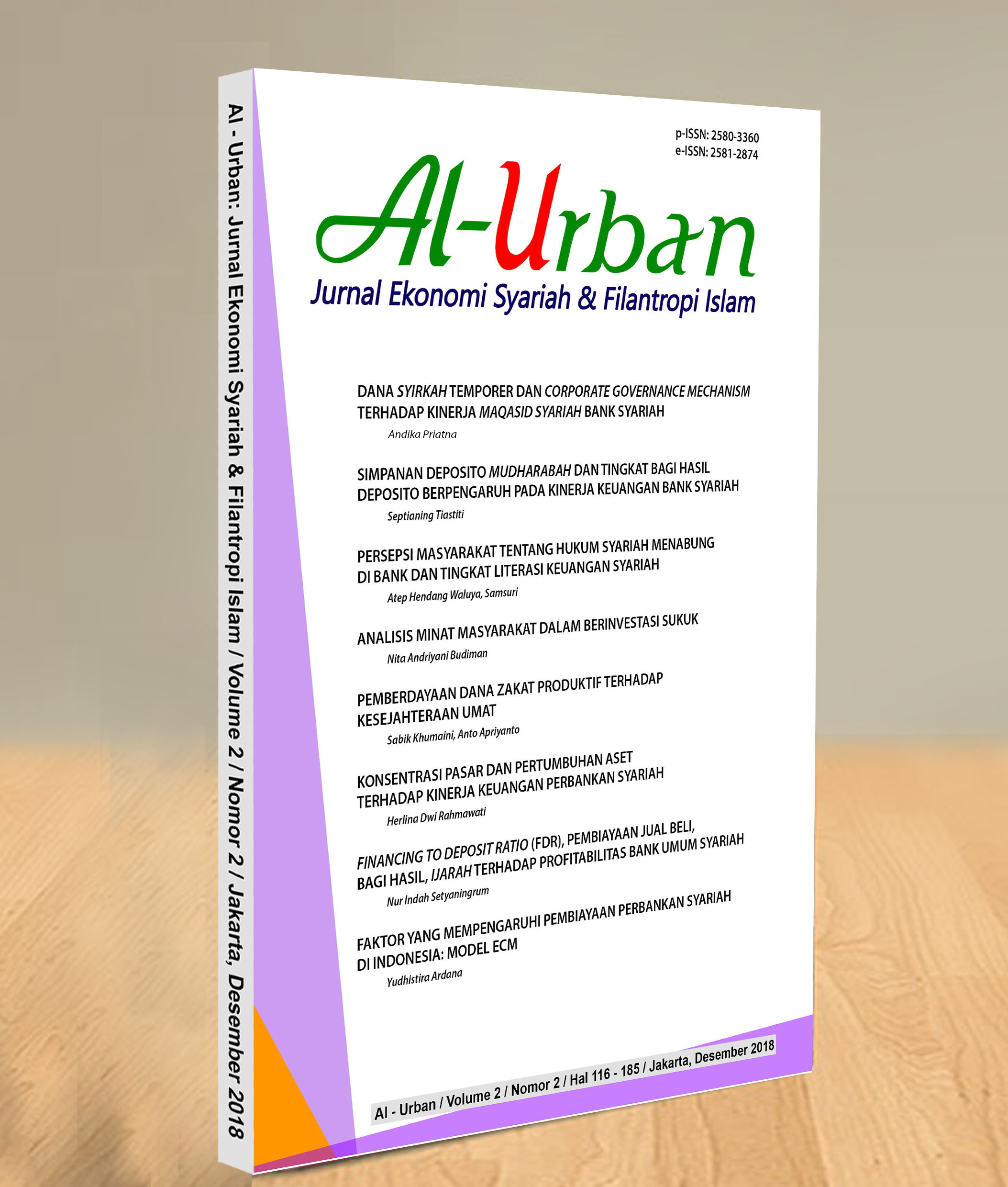Peran Struktur Tata Kelola Internal dalam Meningkatkan Efisiensi Modal Intelektual di Perbankan Syariah
DOI:
https://doi.org/10.22236/alurban_vol6.i2/17419Keywords:
Internal Governance, Intellectual Capital, Islamic Banking, Stakeholder Theory, Operational EfficiencyAbstract
This study aims to analyze the role of internal governance structures in enhancing intellectual capital efficiency in Islamic banking using the stakeholder theory approach. The method employed is a qualitative literature review by analyzing eight previous studies related to internal governance and intellectual capital. The results indicate that an effective internal governance structure, including the role of the Sharia Supervisory Board, accountability, transparency, and inclusive management, significantly enhances human capital, structural capital, and relational capital. Strong governance enables Islamic banking to improve competitiveness, operational efficiency, and sustainability. Additionally, investments in employee training, technology-driven Sharia innovations, and stakeholder relationship management are critical factors in optimizing intellectual capital. However, the limitations of this study include reliance on secondary data, a focus on specific regions, and a lack of quantitative analysis. This study contributes theoretically by emphasizing the importance of stakeholder-based governance in driving intellectual capital efficiency in Islamic banking.
Downloads
References
Aebi, V., Sabato, G., & Schmid, M. (2012). Risk management, corporate governance, and bank performance in the financial crisis. Journal of Banking and Finance, 36(12), 3213–3226. https://doi.org/10.1016/j.jbankfin.2012.07.016
Abdullah, D. F., & Sofian, S. (2012). The relationship between intellectual capital and corporate performance. Procedia-Social and Behavioral Sciences, 40, 537–541.
https://doi.org/10.1016/j.sbspro.2012.03.214
Abeysekera, I. (2010). The influence of board size on intellectual capital disclosure by Kenyan listed firms. Journal of Intellectual Capital, 11(4), 504–518.
https://doi.org/10.1108/14691931011097596
Al-Mutairi, A. R., & Quttainah, M. A. (2017). Corporate governance: Evidence from Islamic banks. Social Responsibility Journal, 13(3), 601–624. https://doi.org/10.1108/SAMPJ-02-2016-0056
Alizadeh, R., Chashmi, S., & Bahnamiri, A. (2014). Corporate governance and intellectual capital. Management Science Letters, 4(1), 181–186.
https://doi.org/10.5267/j.msl.2013.08.004
Al-Musali, M. A. K. M., & Ku Ismail, K. N. I. (2015). Board diversity and intellectual capital performance: The moderating role of the effectiveness of board meetings. Accounting Research Journal, 28(3), 268–283. https://doi.org/10.1108/ARJ-06-2013-0069
Azis, N., & Basri, H. (2019). Intellectual capital and financial performance: The role of good corporate governance (study on Islamic banking in Indonesia). KnE Social Sciences, 3(14), 1–9. https://doi.org/10.18502/kss.v3i14.4293
Blundell, R., & Bond, S. (1998). Initial conditions and moment restrictions in dynamic panel data models. Journal of Econometrics, 87(1), 115–143. https://doi.org/10.1016/S0304-4076(98)00009-8
Bengtsson, M. (2016). How to plan and perform a qualitative study using content analysis. NursingPlus Open, 2, 8–14. https://doi.org/10.1016/j.npls.2016.01.001
Elkington, J. (1997). Cannibals with forks: The triple bottom line of 21st-century business. Capstone.
Farook, S., Kabir Hassan, M., & Lanis, R. (2011). Determinants of corporate social responsibility disclosure: The case of Islamic banks. Journal of Islamic Accounting and Business Research, 2(2), 114–141. https://doi.org/10.1108/17590811111170539
Freeman, R. E. (1984). Strategic management: A stakeholder approach. Boston: Pitman.
Harrison, J. S., Freeman, R. E., & Abreu, M. C. S. de. (2020). Stakeholder theory as an ethical approach to effective management: Applying the theory to multiple contexts. Revista Brasileira de Gestão de Negócios, 22(1), 36–61. https://doi.org/10.7819/rbgn.v22i1.4041
Hamza, H. (2020). Sharia governance in Islamic banks: Effectiveness and challenges. International Journal of Islamic and Middle Eastern Finance and Management, 13(2), 341-366. https://doi.org/10.1108/IMEFM-07-2018-0205
Iswati, S., & Anshori, M. (2007). The influence of intellectual capital to financial performance at insurance companies in Jakarta Stock Exchange (JSE). Proceedings of the 13th Asia Pacific Management Conference, 1392–1399.
Mollah, S., & Zaman, M. (2015). Shari’ah supervision, corporate governance and performance: Conventional vs Islamic banks. Journal of Banking & Finance, 58, 418–435. https://doi.org/10.1016/j.jbankfin.2015.04.030
Mahmudi, B., & Nurhayati, E. (2015). The influence of board governance characteristics on intellectual capital performance. Review of Integrative Business and Economics Research, 4(1), 417.
Mollah, S., & Zaman, M. (2015). Shari’ah supervision, corporate governance and performance: Conventional vs Islamic banks. Journal of Banking & Finance, 58, 418–435. https://doi.org/10.1016/j.jbankfin.2015.04.030
Nawaz, T., & Haniffa, R. (2017). Determinants of financial performance of Islamic banks: An intellectual capital perspective. Journal of Islamic Accounting and Business Research, 8(2), 130–142. https://doi.org/10.1108/JIABR-06-2016-0071
Nowell, L. S., Norris, J. M., White, D. E., & Moules, N. J. (2017). Thematic analysis: Striving to meet the trustworthiness criteria. International Journal of Qualitative Methods, 16(1), 1–13. https://doi.org/10.1177/1609406917733847
Purnomo, H. (2018). Intellectual capital approach for a better corporate governance of sharia banking. Iqtishadia, 11(1), 105–128.
Sardo, F., & Serrasqueiro, Z. (2018). The influence of intellectual capital on financial performance in European companies: An empirical study using the GVA and MVAC methods. International Journal of Accounting and Information Management, 26(3), 414–437. https://doi.org/10.1108/IJAIM-05-2017-0053
Snyder, H. (2019). Literature review as a research methodology: An overview and guidelines. Journal of Business Research, 104, 333–339.
Downloads
Published
How to Cite
Issue
Section
License
Copyright (c) 2022 Al-Urban : Jurnal Ekonomi Syariah dan Filantropi Islam

This work is licensed under a Creative Commons Attribution 4.0 International License.
The Author submiting a manuscript do so on the understanding thet if accepted for publication, copyright of the article shall be assigned to Al-Urban: Jurnal Ekonomi Syariah dan Filantropi Islam, Faculty of Economics and Business, University of Muhammadiyah Prof. DR. HAMKA.
Copyright encompasses exclusive right to reproduse and deliver the article in all form and media, including reprint, photographs, microfilms and any other similar reproductions, as well as transalations. The reproduction of any part of this journal., its storage in database and its transmission by any form or media such as electronic, electrostatic and mechanical copies, photocopies, recordings, magnetic media, etc..will be









